A fortnightly roundup of policy news in the Pacific by the Pacific Institute of Public Policy and the Development Policy Centre.
Australia Security Council bid – Pacific implications
Australia will advocate on behalf of Pacific island countries in relation to the security implications of climate change during its two-year tenure on the UN Security Council. A recent PiPP discussion paper reasons that many future security issues will be driven by climate change, and these issues will drive the international development agenda once the Millennium Development Goals expire in 2015. Australia’s elevated position in the UN coincides with scheduled preparations for a referendum on the political status of New Caledonia and Bougainville coming to the end of its 10-year autonomy transition, with analysts predicting increasing diplomatic pressure over self-determination and decolonisation issues in the region.
Election fever
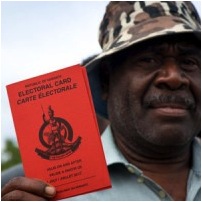 Vote counting continues in Vanuatu after the general election on 30 October that saw a record 346 candidates and 32 parties contesting the 52 parliamentary seats. Diplomats from Australia, New Zealand, China, the EU and US observed polling in an election that has drawn plenty of controversy and debate, with questions also raised about possible discrepancies in electoral roll numbers. Parliament will sit to vote a new prime minister within two weeks of the official results being declared.
Vote counting continues in Vanuatu after the general election on 30 October that saw a record 346 candidates and 32 parties contesting the 52 parliamentary seats. Diplomats from Australia, New Zealand, China, the EU and US observed polling in an election that has drawn plenty of controversy and debate, with questions also raised about possible discrepancies in electoral roll numbers. Parliament will sit to vote a new prime minister within two weeks of the official results being declared.
Palau goes to the polls on 6 November to elect a new president, senate and house of delegates.
Meanwhile, courts in PNG are working through an unprecedented number of challenges to the July election results, with one MP removed on the grounds of being too young.
Pacific migration research
 For decades people from the Federated States of Micronesia, Marshall Islands and Palau have been relocating to Hawaii and Guam, sometimes leading to political and community tensions. New studies estimate the cost to Guam to host Micronesian immigrants was over USD 300 million between 2004-10, but found migration pressures are easing as most people ultimately move on to the US mainland where employment prospects are better.
For decades people from the Federated States of Micronesia, Marshall Islands and Palau have been relocating to Hawaii and Guam, sometimes leading to political and community tensions. New studies estimate the cost to Guam to host Micronesian immigrants was over USD 300 million between 2004-10, but found migration pressures are easing as most people ultimately move on to the US mainland where employment prospects are better.
In two Devpolicy interviews, Anna Berry (available here), from labour-hire company Pasifika Resources, and Rob Hay (available here) from MADEC explain the barriers to increased Pacific seasonal work migration to Australia.
PM Lilo retains power
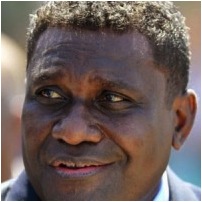 Solomon Islands PM Gordon Darcy Lilo held onto power after a motion of no-confidence was defeated as the opposition leader, Derek Sikua, who put forward the motion, failed to turn up for the vote. Lilo had reshuffled his cabinet prior to the vote after two ministers and a number of backbenchers were thought to have sided with the opposition. Deputy opposition leader, Matthew Wale, received a seven day suspension from parliament during the failed no confidence motion.
Solomon Islands PM Gordon Darcy Lilo held onto power after a motion of no-confidence was defeated as the opposition leader, Derek Sikua, who put forward the motion, failed to turn up for the vote. Lilo had reshuffled his cabinet prior to the vote after two ministers and a number of backbenchers were thought to have sided with the opposition. Deputy opposition leader, Matthew Wale, received a seven day suspension from parliament during the failed no confidence motion.
Off-shore asylum processing update
 Community leaders on PNG’s Manus Island are concerned over the allocation of service contracts for the Australian managed asylum seeker processing centre despite assurances that service providers were expected to procure locally wherever possible. Manus Governor Charlie Benjamin has threatened to withdraw his support for the processing centre if community demands are not met.
Community leaders on PNG’s Manus Island are concerned over the allocation of service contracts for the Australian managed asylum seeker processing centre despite assurances that service providers were expected to procure locally wherever possible. Manus Governor Charlie Benjamin has threatened to withdraw his support for the processing centre if community demands are not met.
In Nauru, the government has revealed plans to charge a fee of AUD 1,000 per month for each person sent to the asylum processing centre, which could cost the Australian Government an estimated AUD 18 million yearly.
ECONOMICS
Tonga central bank Governor warns on bleak economic outlook
 ‘[R]ecent economic developments in Tonga have been negative and our economy is in need of a lot of support.’ That’s the stark conclusion of Governor of the National Reserve Bank of Tonga, Siosi Mafi, writing for Devpolicy. Noting that the Ministry of Finance is projecting virtually zero economic growth for the next two years, that remittances, exports and credit are all falling, and that non-performing loans and public debt levels have reached dangerously high levels, the Governor goes on to warn: ‘If we are to avert a bleak economic future, we need to stop our reliance on private remittances and become more productive.’
‘[R]ecent economic developments in Tonga have been negative and our economy is in need of a lot of support.’ That’s the stark conclusion of Governor of the National Reserve Bank of Tonga, Siosi Mafi, writing for Devpolicy. Noting that the Ministry of Finance is projecting virtually zero economic growth for the next two years, that remittances, exports and credit are all falling, and that non-performing loans and public debt levels have reached dangerously high levels, the Governor goes on to warn: ‘If we are to avert a bleak economic future, we need to stop our reliance on private remittances and become more productive.’
Meanwhile, a bill to increase government expenditure in Tonga by TOP 4.1 million for the 2012-13 budget was recently passed. The majority of this increase is contentiously going toward paying the land leases for a World Bank funded improvement of Fua’amotu International Airport. Under the agreement, the government is responsible for securing the land, while the bank provided a TOP 50 million grant.
Fiji ginger exports to Australia under threat
 Fiji wants to export ginger to Australia, but this is threatened by excessive quarantine measures according to the Fiji Biosecurity Authority in its submission to the Australian Senate inquiry currently underway on the effect on Australian ginger growers of importing fresh ginger from Fiji. The report of the inquiry is due to be tabled on 29 November. All submissions are available here.
Fiji wants to export ginger to Australia, but this is threatened by excessive quarantine measures according to the Fiji Biosecurity Authority in its submission to the Australian Senate inquiry currently underway on the effect on Australian ginger growers of importing fresh ginger from Fiji. The report of the inquiry is due to be tabled on 29 November. All submissions are available here.
Trade negotiations and investment promotion
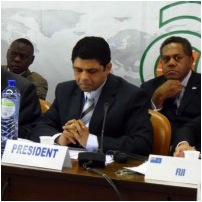 Fiji chaired the latest ministerial trade talks between African Caribbean and Pacific (ACP) states and the European Union with signs of some progress on negotiations on the European Partnership Agreement (EPA) that have dragged on for over ten years. Market access remains a key issue in the multilateral negotiations. WTO Director-General Pascal Lamy praised the ACP group’s ‘instrumental role’ in moving the international trade debate forward.
Fiji chaired the latest ministerial trade talks between African Caribbean and Pacific (ACP) states and the European Union with signs of some progress on negotiations on the European Partnership Agreement (EPA) that have dragged on for over ten years. Market access remains a key issue in the multilateral negotiations. WTO Director-General Pascal Lamy praised the ACP group’s ‘instrumental role’ in moving the international trade debate forward.
Solomon Islands PM Gordon Darcy Lilo was in Australia to promote investment at the fourth Australia-Solomon Islands Business Council Meeting held in Brisbane.
PNG developments
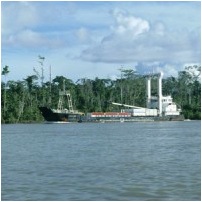 A court in Madang has called a halt to any further work on a marine industrial project, which was to include fish processing facilities, following complaints from landowners.
A court in Madang has called a halt to any further work on a marine industrial project, which was to include fish processing facilities, following complaints from landowners.
PM Peter O’Neill has called on BHP Billiton to hand back control of PNG Sustainable Development Program Ltd so that PNG can manage its own interests in Ok Tedi. Meanwhile, Ok Tedi Mining Ltd have indicated that they are interested in buying into the USD 3.5 billion Frieda River project run by Xstrata Copper but further talks are required between Ok Tedi shareholders, including the PNG government which has a 37 per cent stake.
The Solwara 1 deep sea mining project continues to court controversy, with 24,000 petitioning the PNG government in opposition to this development.
IN BRIEF
- PNG’s media council criticised for silence over journalist’s claim of assault.
- Senator Tony de Brum from Marshall Islands wins peace award.
- Samoa appoints first female judge.
- Preliminary census in PNG confirms population exceeds 7 million.
- Resolution urges Palau to establish relations with mainland China.
- Niue is attempting to forge a free trade agreement with China.
- On the sidelines of the annual global biodiversity conference, SPREP signed an MOU to increase cooperation with the UN Environment Programme and the CBD.
- Expressions of interest close on 2 November for the third annual conference at Deakin University in Australia on PNG in Transition.
- A two-week military exercise has concluded off the coast of New Caledonia, which brought together defence forces from Australia, Canada, France, New Zealand, Papua New Guinea, Tonga, United Kingdom, United States and Vanuatu to strengthen regional co-operation and disaster response measures.
Editorial content is the responsibility of Derek Brien, PiPP Executive Director, and Stephen Howes, DevPolicy Director.


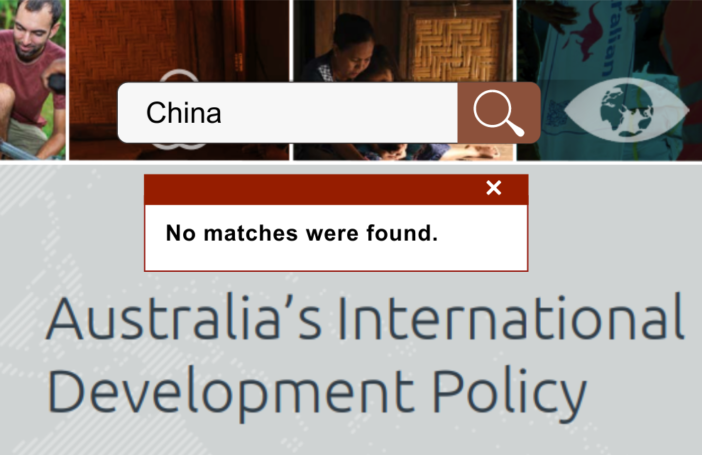
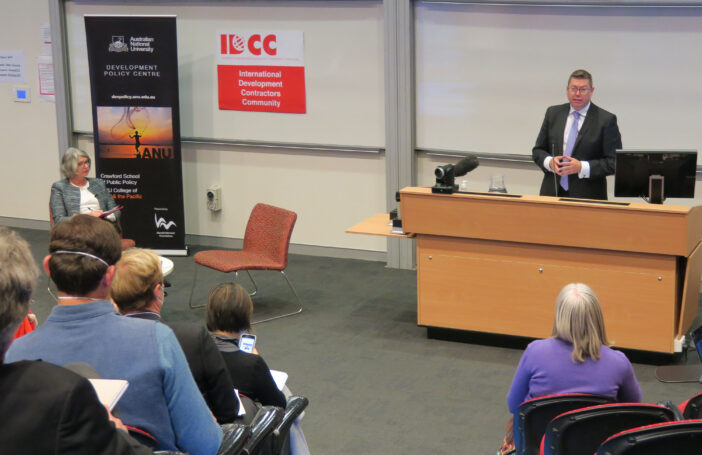


Interesting reading about Tonga!